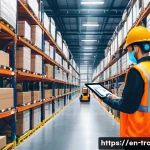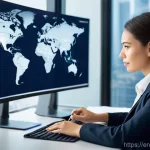Hey there, future trade titans! Ever find yourself scrolling through job boards, feeling that familiar pang of “is this really it?” Many of us hit a crossroads where our current path just doesn’t spark joy or fulfill our ambitions, especially in today’s rapidly shifting global economy.
The good news? The dynamic world of international trade, far from being just about shipping containers, is actually buzzing with incredible, future-proof opportunities for those ready to make a strategic pivot.
With the explosive growth of e-commerce, the critical push for sustainable supply chains, and groundbreaking AI innovations transforming logistics, this industry isn’t just evolving—it’s reinventing itself at lightning speed.
I’ve personally seen countless individuals, myself included, successfully navigate this exciting landscape, leveraging their unique skills to land impactful roles.
It’s not just about changing jobs; it’s about crafting a career that’s resilient, rewarding, and truly global. So, if you’re looking to unlock a career that truly excites you and positions you for long-term success, let’s dive into the exact strategies that can make your trade industry transition a resounding success.
Reassessing Your Skillset for Global Impact

So, you’re thinking about a jump into international trade, huh? That’s fantastic! But before you start dreaming of deals across continents, take a real, honest look at what you’ve already got in your professional toolkit.
I’ve met so many people who feel like their previous experience is irrelevant, only to discover it’s actually a goldmine of transferable skills. Think about it: problem-solving from your customer service days, project management from that big internal initiative, or even just your knack for learning new software.
These aren’t just footnotes on a resume; they’re the foundational blocks for a successful career in a globalized world. When I first considered pivoting, I was convinced my background in marketing was too niche, but I quickly realized that understanding consumer behavior and market trends is absolutely crucial when you’re dealing with international clients.
Don’t underestimate what you already bring to the table – often, it’s not about starting from scratch, but about reframing your existing talents for a new stage.
Unearthing Your Transferable Talents
This is where the magic happens, folks. Seriously, sit down and map out every single skill you’ve honed, even if it feels mundane. Did you manage budgets?
That’s financial acumen. Negotiate with suppliers? Hello, international procurement!
Even strong communication skills, whether written or verbal, are absolutely invaluable when you’re bridging cultural gaps and dealing with partners who might not share your first language.
My buddy, Mark, used to be an event planner. He thought he was stuck, but he leveraged his incredible organizational skills, his ability to handle multiple vendors, and his knack for crisis management directly into a role managing international logistics for a tech company.
It’s all about translating your past achievements into the language of global trade. I mean, if you can keep a bridal party on schedule, you can certainly track a shipment from Shenzhen to Seattle!
Bridging the Knowledge Gaps Strategically
Once you’ve identified your existing strengths, it’s time to be honest about where you might need a little polish. No one expects you to know everything on day one – that’s unrealistic!
The key is to be strategic about filling those gaps. Are you shaky on Incoterms? Do you need a crash course in customs regulations for specific regions?
Maybe you’re aiming for a role in trade finance and need to brush up on international banking practices. The good news is, there are tons of resources out there, from online courses offered by reputable universities to industry-specific certifications.
I personally found that a short course on global supply chain management gave me the vocabulary and frameworks I needed to confidently apply for roles that initially felt out of reach.
It’s not about getting another degree; it’s about targeted learning that gives you a competitive edge.
Navigating the Labyrinth of Niche Markets
The world of international trade is vast, almost overwhelmingly so. When you’re first dipping your toes in, it’s easy to feel lost, like you’re staring at a giant map with no clear destination.
But here’s a pro tip I learned the hard way: don’t try to conquer the entire globe at once. Instead, focus on finding your niche. The real opportunities often lie in specialized sectors or specific geographic regions where your unique background, language skills, or even just your genuine interest can give you a significant advantage.
Think about it – a specialist in sustainable agricultural exports to Northern Europe will likely have more success and command more respect than a generalist trying to dabble in everything.
I’ve found that narrowing your focus not only makes your job search more targeted but also allows you to develop deep expertise faster, making you an invaluable asset to potential employers.
Identifying Untapped Opportunities
This is where some serious detective work comes in, and frankly, it’s pretty fun. Start looking for emerging markets or industries that are experiencing rapid growth.
Are there specific products seeing huge demand overseas? What about countries that are becoming major players in certain manufacturing sectors? For instance, I recently coached someone who had a background in renewable energy.
We identified a burgeoning market for solar panel components in Southeast Asia, and with a little focused research, they landed a role with a company specializing in that very niche.
Don’t be afraid to look beyond the obvious. Sometimes, the “untapped” opportunities are simply those that require a bit more digging, a bit more curiosity, and a willingness to explore less conventional paths.
Follow industry news, read trade publications, and listen to podcasts – the clues are everywhere if you know how to spot them.
Deep Diving into Market Research
Once you’ve got a few potential niches in mind, it’s time to get granular. This isn’t just about reading a few articles; it’s about really understanding the landscape.
What are the key regulatory hurdles in that market? Who are the major competitors? What are the cultural nuances that could impact business dealings?
Tools like government trade reports, export-import databases, and even economic data from international organizations can be incredibly helpful. For example, if you’re looking at food exports to Japan, understanding their stringent import standards and consumer preferences is absolutely non-negotiable.
I remember one time, I overlooked a seemingly minor customs regulation for a specific product going into Canada, and it caused a huge delay and extra costs.
Learn from my mistake: thorough market research isn’t just good practice; it’s your first line of defense against costly errors and a key to proving your value.
Mastering the Digital Tools of Modern Trade
Let’s be real, the days of doing everything with paper ledgers and faxes are long gone. If you want to thrive in international trade today, you simply have to be fluent in the digital language of the industry.
This isn’t just about being “tech-savvy” in a general sense; it means understanding and utilizing the specific software, platforms, and AI-driven solutions that are streamlining everything from supply chain management to customs declarations.
I’ve personally seen how a strong grasp of these tools can completely transform efficiency, cut costs, and open up new opportunities. Being proficient in the right digital ecosystem isn’t just an advantage; it’s rapidly becoming a baseline requirement.
Think of it as your digital passport to the global marketplace – without it, you’re going to struggle to even get through security.
Embracing AI and Automation
Okay, so AI might sound intimidating, but trust me, it’s not about robots taking over your job; it’s about leveraging smart tech to make your job easier and more effective.
AI is revolutionizing everything from predicting supply chain disruptions to optimizing shipping routes and even automating routine compliance checks.
Learning how to work *with* AI tools, rather than fearing them, is a huge differentiator. I recently started using an AI-powered platform that analyzes global trade data to identify potential new markets for my clients, and the insights it provides are incredible – far beyond what I could ever find manually.
Getting comfortable with these technologies, even if it’s just understanding their capabilities and how they integrate into existing workflows, will position you as a forward-thinking professional in a rapidly evolving field.
Essential Software for Seamless Operations
Beyond AI, there’s a whole suite of practical software you’ll want to get familiar with. We’re talking about things like Enterprise Resource Planning (ERP) systems, Customer Relationship Management (CRM) tools, and specialized Trade Management Systems (TMS).
These platforms are the backbone of modern international trade operations. For instance, knowing your way around a popular ERP system like SAP or Oracle can give you a massive leg up, as many large international companies rely on them for managing everything from inventory to finance.
Even familiarity with logistics platforms like Flexport or Freightos, or communication tools like Slack and Microsoft Teams, can make a huge difference.
I always advise people to look at job descriptions for roles they aspire to and see what software is consistently listed – then, make it your mission to gain some hands-on experience, even if it’s just through online tutorials or free trials.
It shows initiative and preparedness, and believe me, hiring managers notice that.
Building a Network That Opens Doors
Look, success in international trade isn’t just about what you know; it’s often about *who* you know. I can’t stress this enough: networking is absolutely crucial.
It’s not about collecting business cards; it’s about building genuine relationships with people who can offer advice, introduce you to opportunities, or even become future collaborators.
My first major breakthrough in this industry came from a casual conversation at a local chamber of commerce event – someone I met there eventually connected me to my first international client.
You never know where your next big opportunity will come from, so being proactive about expanding your professional circle is non-negotiable. Think of your network as your personal support system and information highway in the sometimes-complex world of global business.
Leveraging Online Communities and Events
In today’s digital age, networking isn’t just about shaking hands at conferences. Online communities are thriving, and they’re an absolute goldmine. Platforms like LinkedIn are a given, but also look for industry-specific forums, Facebook groups, or even Slack channels dedicated to international trade, logistics, or specific regional markets.
Engage genuinely, share insights, ask thoughtful questions, and offer help where you can. Beyond online, keep an eye out for virtual and in-person industry events, webinars, and trade shows.
Even if you can’t afford to fly to a major international expo, many organizations offer free webinars or local meetups. I’ve found that attending even small, local business events can lead to unexpected connections.
The key is showing up, being present, and being open to conversation.
The Power of Mentorship in Global Trade
This is one of the most underrated strategies, in my opinion. Finding a mentor – someone who has walked the path you’re on and is willing to share their wisdom – can accelerate your career trajectory exponentially.
A good mentor can provide invaluable insights into industry nuances, help you navigate tricky situations, and even make introductions to their network.
I was incredibly lucky to have a fantastic mentor early in my career who helped me understand the unspoken rules of international negotiations and introduced me to key players.
Don’t be afraid to reach out to experienced professionals whose work you admire. A polite, well-articulated request for a brief informational interview or coffee chat can often lead to a lasting mentorship.
Most seasoned professionals are actually quite keen to give back and share their expertise with eager newcomers.
From Classroom to Cargo Ship: Practical Learning Paths

Let’s face it, classroom learning is essential, but it only gets you so far in the real world of international trade. This industry is incredibly dynamic, and practical experience often trumps purely theoretical knowledge.
While a degree can lay a solid foundation, truly understanding the nitty-gritty of global logistics, customs clearance, or international finance often comes from getting your hands dirty.
I’ve seen countless individuals, myself included, truly hit their stride when they started applying what they learned in real-world scenarios. It’s about bridging that gap between knowing *about* trade and actually *doing* trade.
This isn’t to say formal education isn’t important, but rather that it needs to be complemented with avenues that provide tangible, hands-on exposure to the industry’s operations.
Certifications That Command Respect
If a full degree isn’t feasible or you already have one, specific certifications can be incredibly powerful. They signal to employers that you have a focused, up-to-date understanding of particular aspects of international trade.
Think about certifications in areas like Certified Global Business Professional (CGBP), Certified Customs Specialist (CCS), or various supply chain management accreditations.
These aren’t just fancy titles; they often involve rigorous testing and demonstrate a commitment to professional development. When I was looking to specialize in trade compliance, getting a customs brokerage license in my region not only boosted my resume but also gave me a deep, practical understanding of regulations that I use every single day.
They show that you’re not just interested, but invested in the field.
Experiential Learning: Internships and Projects
Nothing, and I mean nothing, beats hands-on experience. If you’re making a career pivot, look for internships, even unpaid ones if your situation allows, or volunteer for projects that give you exposure to international operations.
Can you help a local small business with their first export? Can you take on a pro-bono project researching import duties for a non-profit? These experiences, no matter how small, build your resume and give you tangible examples to talk about in interviews.
I started by helping a friend who was importing handicrafts, managing their inventory and basic customs paperwork. It wasn’t glamorous, but it gave me invaluable insight into the actual flow of goods and documentation.
These real-world applications of your skills are what truly set you apart.
Crafting Your Personal Brand in a Global Arena
In today’s interconnected world, your personal brand is more important than ever, especially if you’re looking to make a splash in international trade.
It’s not just about having a strong resume; it’s about curating a consistent and compelling narrative around your expertise, your passions, and your unique value proposition.
Think of yourself as a product – how are you presenting yourself to the global market? Your brand communicates your professionalism, your specific areas of knowledge, and what makes you the go-to person for certain types of international business challenges.
I’ve found that consciously building my brand helped me attract opportunities rather than constantly chasing them. It’s about becoming a recognized expert in your chosen niche.
Online Presence: Your Digital Passport
Your online presence is your digital passport in the global trade world. LinkedIn is absolutely non-negotiable. Make sure your profile is meticulously updated, highlights your international interests and skills, and showcases any relevant projects or certifications.
Engage with industry leaders, share insightful articles, and even publish your own short posts on topics you’re passionate about. Consider creating a personal website or an online portfolio if you have specific case studies or reports you can share.
Remember, potential employers and partners will almost certainly Google you, so ensure what they find presents a professional, knowledgeable, and internationally-minded individual.
I constantly tweak my LinkedIn profile, adding new certifications and updating my “about” section to reflect my evolving expertise and ensure it aligns with the kind of global opportunities I want to attract.
Articulating Your Unique Value Proposition
What makes you different? Why should someone hire you or partner with you over someone else? Your unique value proposition (UVP) is your elevator pitch, your core message that succinctly explains the distinct benefits you bring to the table.
In international trade, this might involve specific language skills, deep cultural understanding of a particular region, expertise in a niche product category, or a proven track record in navigating complex regulations.
Practice articulating this UVP clearly and confidently. It’s not bragging; it’s clearly defining your expertise and how it solves specific problems for international businesses.
For instance, my UVP became my ability to not only understand logistics but also to effectively bridge communication gaps between Western and Asian business cultures, saving clients time and preventing misunderstandings.
Monetizing Your Newfound Expertise
Alright, let’s talk brass tacks: money. You’re making this pivot for a reason, and a big part of that is often about creating a more financially rewarding and stable career.
The good news is, international trade offers a wide spectrum of earning potential, from entry-level coordinator roles to high-flying executive positions and even entrepreneurial ventures.
But understanding how compensation works and how you can maximize your income streams is key. This isn’t just about negotiating your salary; it’s about strategically positioning yourself for growth and recognizing the diverse ways you can be rewarded for your specialized skills in the global marketplace.
I’ve learned that truly understanding the value of your specific expertise is the first step to ensuring you’re compensated fairly, and even handsomely.
Understanding Compensation Structures
Salaries in international trade can vary significantly based on the specific role, industry, location, and your level of experience. For instance, a customs broker in New York City will likely earn differently than a supply chain analyst in Kansas City, or an export sales manager operating out of London.
Research average salaries for the roles you’re targeting using sites like Glassdoor, LinkedIn Salary, and industry-specific salary surveys. Also, consider the total compensation package, which often includes bonuses, commissions (especially in sales roles), health benefits, and retirement plans.
I remember when I first started, I was so focused on the base salary that I almost overlooked a fantastic benefits package that actually added significant value to my overall compensation.
Always look at the bigger picture and understand all the components of your potential earnings.
Diversifying Your Income Streams
Beyond a traditional salary, there are numerous ways to monetize your international trade expertise. This is where things get really exciting, especially if you have an entrepreneurial spirit.
Could you offer consulting services to small businesses looking to export? Perhaps you could develop and teach online courses on specific aspects of international trade, like Incoterms or import regulations.
There’s also the potential for freelance work in areas like trade compliance, market research, or even international business development on a project basis.
I’ve personally found success in offering bespoke market entry strategy consulting to startups, leveraging my experience without being tied to a single employer.
This diversification not only boosts your income but also builds your brand and reduces financial dependence on one source, making your career more resilient.
| Key Role in International Trade | Primary Responsibilities | Essential Skills | Potential Growth Path |
|---|---|---|---|
| Supply Chain Analyst | Optimizing logistics, managing inventory, predicting demand. | Analytical thinking, data analysis, project management, software proficiency (ERP/SCM). | Senior Analyst, Supply Chain Manager, Operations Director. |
| International Sales Manager | Developing global sales strategies, managing client relationships, market entry. | Negotiation, cross-cultural communication, language skills, market research, CRM tools. | Regional Sales Director, Head of International Business Development. |
| Trade Compliance Specialist | Ensuring adherence to import/export laws, managing documentation, risk assessment. | Regulatory knowledge, attention to detail, legal interpretation, customs software. | Compliance Manager, Head of Global Trade Compliance. |
| Logistics Coordinator | Arranging shipments, tracking cargo, liaising with carriers and customs. | Organization, communication, problem-solving, logistics software, Incoterms knowledge. | Logistics Manager, Freight Forwarder, Supply Chain Planner. |
Closing Thoughts
So, there you have it, folks! Navigating the dynamic and rewarding world of international trade is absolutely within your grasp, no matter where you’re starting from.
It’s a journey that demands a bit of introspection, strategic learning, and a willingness to step outside your comfort zone, but the rewards are truly immense.
From discovering your hidden talents to leveraging cutting-edge digital tools and building a powerful network, every step you take builds a stronger, more resilient, and globally-minded professional.
I’ve personally seen how these insights can transform careers, and I’m genuinely excited for you to experience that same growth.
Useful Information to Know
1. Master Cross-Cultural Communication: It’s not just about speaking a common language, but understanding the subtle nuances, body language, and etiquette that vary wildly across cultures. I remember once almost derailing a deal by being too direct in a culture that valued indirect communication; learning to adapt saved the partnership. Always research and practice cultural sensitivity.
2. Leverage LinkedIn Like a Pro: This platform is your digital business card and networking hub for international trade. Don’t just list your jobs; showcase your global mindset, certifications, and engage with industry leaders. It’s how I connect with so many amazing people and discover new opportunities.
3. Stay Updated on Regulations: International trade rules are constantly evolving. Tariffs, customs procedures, and compliance requirements can change rapidly. Subscribing to trade news, attending webinars, and even joining a professional organization can keep you informed and prevent costly mistakes. It’s like having a compass in a constantly shifting landscape.
4. Consider a Niche Certification: While a degree is great, targeted certifications like Certified Global Business Professional (CGBP) or a customs brokerage license can give you a sharp, competitive edge. They demonstrate specialized knowledge that employers highly value, showing you’re not just interested, but deeply invested.
5. Think Beyond Traditional Employment for Monetization: Your expertise can be a goldmine for consulting, online courses, or even freelance projects. Diversifying your income streams not only adds financial stability but also builds your personal brand as a go-to expert in the global marketplace. I’ve personally found this freedom incredibly empowering!
Key Takeaways
The journey into international trade is fundamentally about embracing growth and adaptation. First and foremost, a deep, honest self-assessment of your existing skill set, reframing your experiences for a global context, is non-negotiable.
You’d be surprised how many seemingly unrelated skills become incredibly valuable when you look at them through an international lens. Secondly, strategic market identification and a genuine commitment to understanding cultural and regulatory nuances are your bedrock; this isn’t a “one-size-fits-all” world, and success hinges on targeted, informed approaches.
Thirdly, becoming fluent in the digital language of modern trade, from AI-driven insights to essential software platforms, isn’t just an advantage—it’s rapidly becoming a fundamental requirement.
Lastly, and I cannot emphasize this enough, actively building a robust, diverse professional network and seeking out mentorship will open doors and provide guidance that no textbook ever could.
Remember, success in this arena isn’t just about what you know, but who you know and how effectively you can connect across borders. By integrating these principles with a genuine, human touch, you’re not just entering international trade; you’re poised to truly thrive in it.
Frequently Asked Questions (FAQ) 📖
Q: What makes international trade such a resilient and future-proof career path when so many industries feel uncertain right now?
A: Oh, this is such a fantastic question, and one I’ve pondered myself! We’re living in a whirlwind, right? But here’s the kicker: international trade isn’t just surviving; it’s absolutely thriving.
From my perspective, what makes it so incredibly resilient boils down to a few dynamic forces. First, e-commerce isn’t just a trend; it’s the new backbone of global buying and selling.
Think about it – every online purchase from another country involves a complex web of international trade, and that’s only going to grow. We’re seeing projections of continued growth in world merchandise trade, which really underscores its stability.
Then there’s the incredible impact of AI and cutting-edge logistics. These aren’t taking jobs away as much as they’re transforming them, creating new roles focused on optimizing supply chains, predicting demand, and streamlining everything from customs to shipping times.
I’ve seen firsthand how these innovations make operations smoother and more efficient, actually opening up more opportunities rather than closing them.
Plus, the global push for sustainable supply chains means there’s a constant demand for professionals who can make trade greener and more ethical. It’s a field that constantly reinvents itself, adapting to new technologies and global priorities, which honestly makes it feel less like a job and more like being part of a living, breathing, evolving ecosystem.
It truly offers a strong sense of stability and impact in a world that often feels anything but stable.
Q: I don’t have a specific “international trade” degree or years of experience. Is it genuinely possible for someone like me to make this career switch?
A: Absolutely, 100% yes! And let me tell you, this is where it gets really exciting. I’ve personally mentored individuals from wildly different backgrounds – teachers, marketing pros, even folks straight out of customer service – who have successfully pivoted into international trade.
What I’ve learned, and what the industry is increasingly recognizing, is that it’s less about a specific degree and more about transferable skills and a hunger to learn.
Do you have a knack for problem-solving? Are you detail-oriented? Can you communicate effectively?
These are gold in international trade, whether you’re navigating customs regulations or coordinating shipments across continents. Many seasoned professionals in global trade didn’t even study it specifically; they learned on the job.
Today, there’s a massive shift towards skills-based hiring, meaning companies are looking at what you can do rather than just where you studied. Internships are also incredibly valuable, offering hands-on experience that can lead directly to job opportunities.
Don’t underestimate the power of online courses, either; they can quickly equip you with foundational knowledge that shows initiative and dedication. Trust me, your unique experiences bring a fresh perspective, and that’s a huge asset in such a diverse, global field!
Q: This sounds exciting! But where do I actually begin to make this pivot into the international trade world?
A: I hear you – making a big career change can feel like staring at a massive, complex puzzle! But let’s break it down into actionable steps, because from my own journey, I know how empowering those first few moves can be.
First things first, start by getting curious! Dive into online resources to understand the basics of import/export and global economic trends. There are fantastic, affordable online courses that can give you a solid foundation without needing a full degree.
Next, and this is crucial, network like crazy! LinkedIn is your best friend here. Connect with professionals in roles that intrigue you – a friendly message asking for a 15-minute informational interview can open doors you never imagined.
You’d be surprised how willing people are to share their insights. I’ve found that these conversations are invaluable for understanding the day-to-day realities of different roles.
Consider entry-level positions like a shipping clerk, import-export coordinator, or freight forwarder. These roles are incredible for gaining hands-on experience and seeing the industry from the ground up.
And don’t shy away from internships; even if they’re unpaid initially, the experience and contacts you gain are priceless. Finally, think about identifying a niche that genuinely excites you – maybe it’s sustainable logistics, e-commerce export, or compliance.
Focusing your learning and networking efforts can make the path feel much clearer and less overwhelming. Just take that first step, and the momentum will build!






